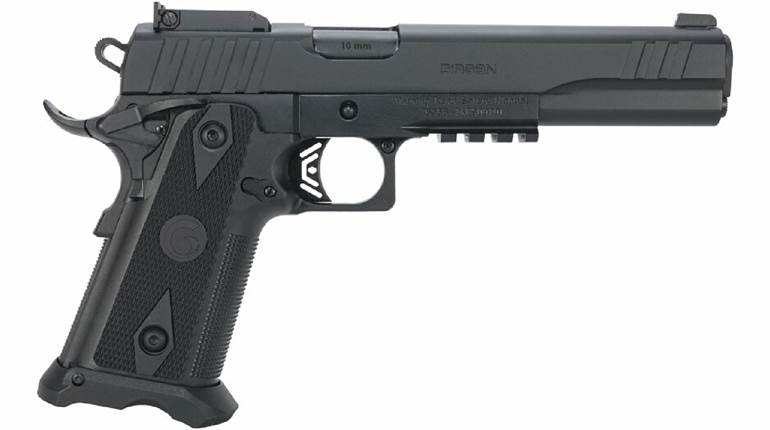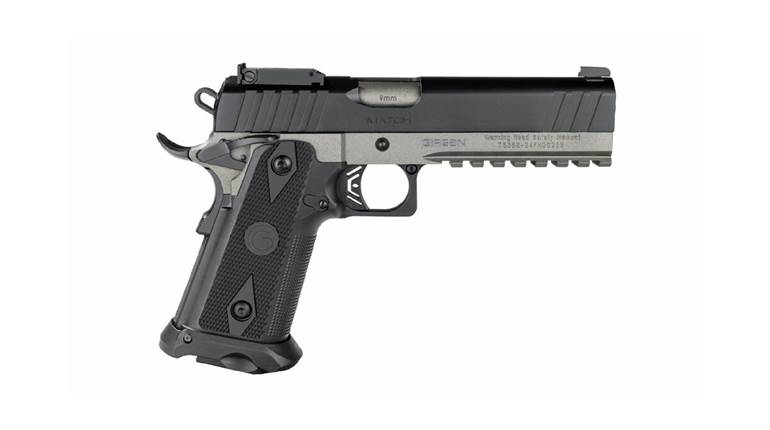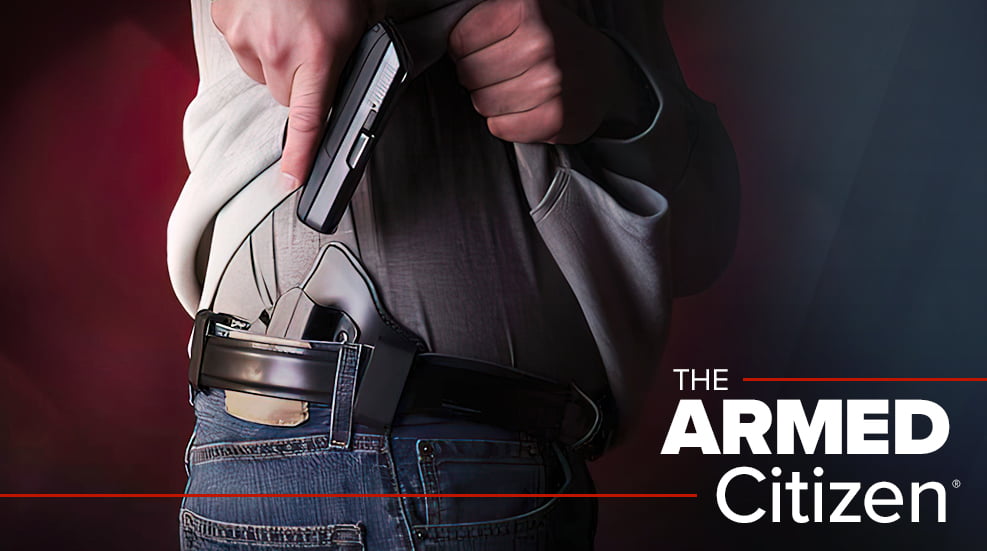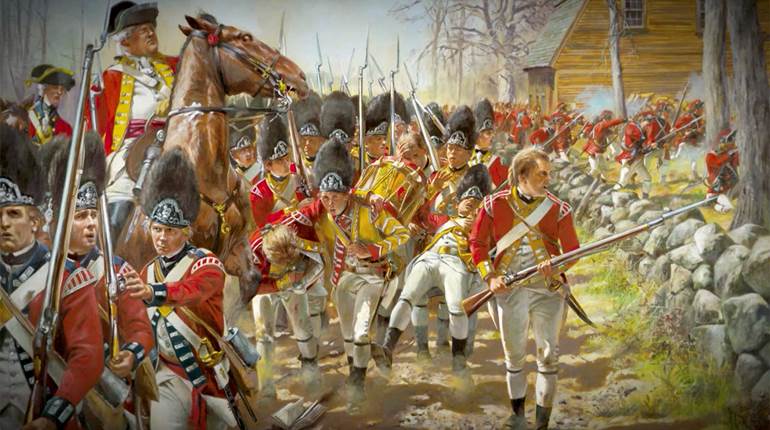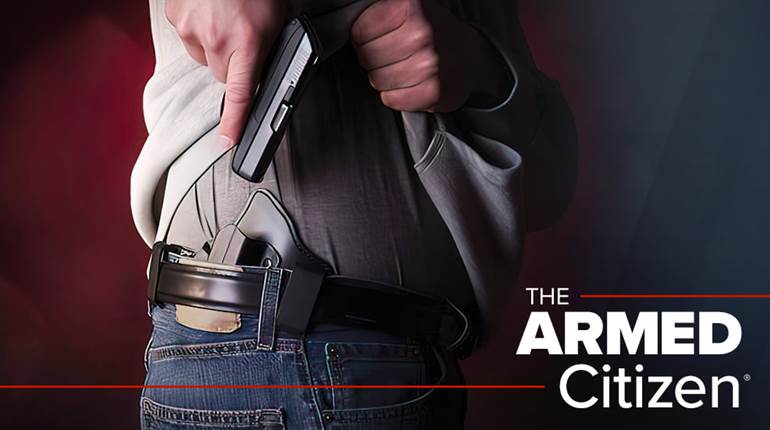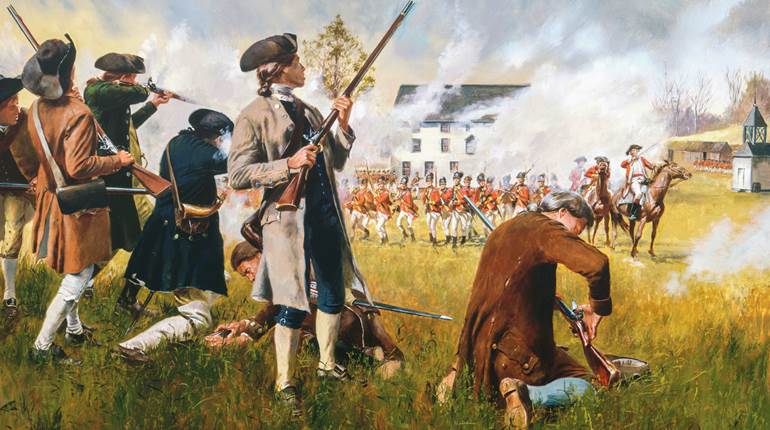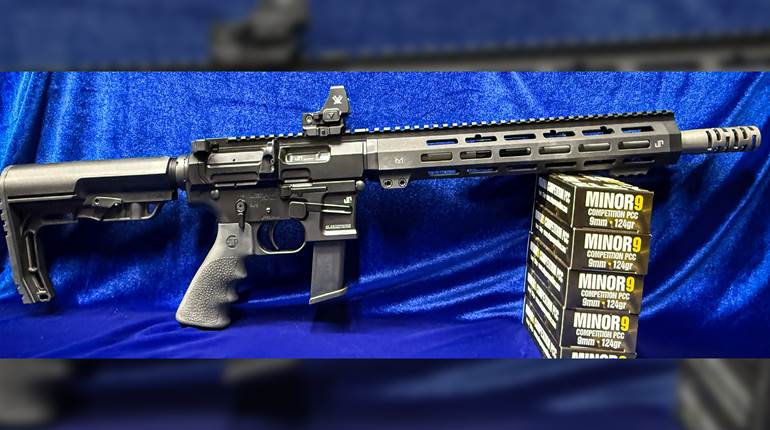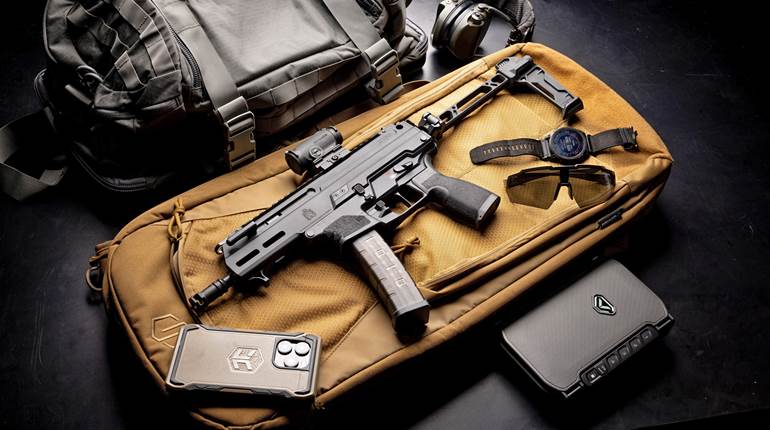
Henry Repeating Arms is an American gun manufacturer with a well-deserved reputation for producing top-notch, classically styled lever-action rifles. These manually operated long guns are chambered for a variety of rimfire and center-fire cartridges. One of the company's most popular products is its Model H001 .22-cal. lever-action and its variants. But Henry's rimfire fun is not limited to just lever guns, it also offers the bolt-action Mini Bolt for youngsters and an unusual lightweight collapsible survival semi-automatic called the U.S. Survival AR-7. So how do the Henry bolt-action and semi-automatic compare with its well-known lever .22s? To find out, these rifles were taken out for a test drive using the same .22 Long Rifle ammunition to check the function and accuracy of each.
Lever-Action .22 Rimfire Rifles
Henry's series of lever-action .22 rimfire rifles provide an excellent balance of reliable function and good looks for an affordable price. The blued steel barrel and magazine tube are attached to an aluminum receiver and fitted with handsome American walnut stocks. The square front sight blade is hooded and the rear sight is fully adjustable. The receiver
 has a milled-in scope base for mounting optics. The external safety for this rifle is the hammer's half-cock position, which locks the trigger until the hammer is moved to the fully-cocked position.
has a milled-in scope base for mounting optics. The external safety for this rifle is the hammer's half-cock position, which locks the trigger until the hammer is moved to the fully-cocked position.
To load the rifle, the brass-colored magazine tube liner is given a slight twist and then pulled out of the magazine tube until the loading port is exposed. Rounds are dropped into the magazine tube and then the liner is reinserted. Cycling the lever will chamber the first round and the gun is ready to fire.
The first configuration option for this platform is the adult-size Classic H001 model with an 18.25-inch barrel and 14-inch length of pull (LOP). The H001 has an ammunition capacity of 15-rounds when loaded with .22 Long Rifle (LR) cartridges, 17-rounds of .22 Long (if you can find them), and 21 rounds of .22 Short. The Carbine (H001l) model retains the 14-inch LOP shoulder stock of the H001, but the barrel has been shortened to 16.125-inches long. This reduces the ammunition capacity of the Carbine to 12-rounds of .22 LR. The Youth Model (H001Y) incorporates a 16.125-inch barrel with a 13-inch LOP shoulder stock. With suggested retail prices ranging from $360 to $370, real-world prices for the Henry rimfire lever actions tend to hover around the $300 mark. It's a very fair price for what you get.
For this review, the rifle tested was the 16.125-inch-barrel Youth Model. It was chosen for two reasons. First, the barrel length and sight radius are nearly the same as those of the other two test guns, which gave them a fighting chance in the accuracy department. Secondly, being 3.50-inches shorter and a full pound lighter than the classic version, the Youth Model is an even handier version of an already user-friendly design. The trigger pull for this lever-action measured 3-pounds, 8-ounces, with a little travel after a crisp break. The lever, as well as the rest of the action, was buttery smooth right out of the box.
 For the smallest of the new shooters among us, Henry offers the compact single-shot Mini Bolt Youth Rifle. The Mini features an all-weather construction with a barrel and action made of stainless steel and a one-piece polymer stock currently available in either a black or Muddy Girl camouflage finish. The 16.125-inch barrel is topped with a set of Williams Fire Sights. This highly visible system provides a three-dot sight pattern with a fixed red fiber-optic up front and two green fiber-optic dots on the fully adjustable rear sight. The barrel is drilled and tapped to accept a model H005 scope base in place of the rear sight.
For the smallest of the new shooters among us, Henry offers the compact single-shot Mini Bolt Youth Rifle. The Mini features an all-weather construction with a barrel and action made of stainless steel and a one-piece polymer stock currently available in either a black or Muddy Girl camouflage finish. The 16.125-inch barrel is topped with a set of Williams Fire Sights. This highly visible system provides a three-dot sight pattern with a fixed red fiber-optic up front and two green fiber-optic dots on the fully adjustable rear sight. The barrel is drilled and tapped to accept a model H005 scope base in place of the rear sight.
The Mini weighs in at just 3.25-pounds with an 11.5-inch length-of-pull (LOP). The European-style bolt features a flattened bolt handle and a knurled cocking knob. The sliding safety lever is located on the left side of the receiver and blocks the trigger from cycling when engaged. The stainless steel trigger of the black-stocked rifle used for this test had a 3-pound, 3-ounce trigger pull with some travel before and after the break.
As a single-shot rifle that requires a simple, but deliberate, set of steps in order to fire, the Mini encourages young students to focus on the quality of each shot they take rather than on the volume of lead they can launch. With the rifle pointed down range towards the intended target, the operation starts by sliding the safety back (towards the shoulder stock) into the Safe position. Lifting the bolt handle and pulling the bolt into the open position exposes the chamber. The .22 cartridge must be manually placed directly into the chamber because the chamber mouth rests about a quarter of an inch above the bolt channel. If a round is dropped into the bolt channel, it has to be lifted out in order to be placed in the chamber. With a round chambered, cycle the bolt into the closed position, pull the cocking knob (towards the shoulder stock) until it locks in place, press the safety lever forward (toward the muzzle) into the Fire position, and then pull the trigger.
The Mini is listed as being able to fire .22 Short and .22 Long Rifle ammunition, but it seems likely that .22 Long would work as well. The abbreviated stock is a bit too short to be comfortable for an adult to use, but my son, who started shooting just a few months ago, found the rifle to be a terrific fit. He especially likes the bright sight system. I was pleased to see that the craftsmanship of the Mini is on par with the adult models Henry produces, especially since some of the youth single shots on the market can be fairly rough in the fit and finish departments. With a suggested retail of $275, it’s not hard to find the Mini Bolt for around $220 off-the-rack.
The third gun in this line up is Henry's version of the AR-7 survival rifle, originally designed by Eugene Stoner, who is famous for his M-16/AR-15 rifle. Since 1959, the AR-7 has been in service with the U.S. Air Force, providing pilots with a small-caliber rifle for emergency landings in wilderness areas. Over the years, the AR-7 has been manufactured by various  companies, with Henry being the latest. Like the original AR-7, the Henry U.S. Survival rifle is light weight at just 3.50-pounds. When disassembled, the barrel, receiver, and the two provided 8-round magazines can be stowed in the hollow ABS plastic shoulder stock. The stock is just 16.50-inches long, so it will comfortably fit into backpacks or the cargo compartments of boats, planes, or trucks.
companies, with Henry being the latest. Like the original AR-7, the Henry U.S. Survival rifle is light weight at just 3.50-pounds. When disassembled, the barrel, receiver, and the two provided 8-round magazines can be stowed in the hollow ABS plastic shoulder stock. The stock is just 16.50-inches long, so it will comfortably fit into backpacks or the cargo compartments of boats, planes, or trucks.
 The U.S. Survival's barrel has a rugged rifled steel insert wrapped in an ABS plastic sleeve, making it light-weight and strong. The simple sight system consists of a bright orange polymer blade front sight and a height-adjustable peep sight in the rear. Henry recently made an improvement to the original design by adding a grooved sight rail to the receiver so that a scope can be mounted. The receiver is treated with a corrosion-resistant Teflon coating to protect against harsh, wet environmental conditions. A thumb safety is located on the receiver’s right side with the magazine release located on the left side inside of the trigger guard.
The U.S. Survival's barrel has a rugged rifled steel insert wrapped in an ABS plastic sleeve, making it light-weight and strong. The simple sight system consists of a bright orange polymer blade front sight and a height-adjustable peep sight in the rear. Henry recently made an improvement to the original design by adding a grooved sight rail to the receiver so that a scope can be mounted. The receiver is treated with a corrosion-resistant Teflon coating to protect against harsh, wet environmental conditions. A thumb safety is located on the receiver’s right side with the magazine release located on the left side inside of the trigger guard.
Assembly of the U.S. Survival is accomplished by removing the shoulder stocks butt cap and extracting the components contained inside. The receiver is attached via a screw in the pistol grip of the stock. Lining up a stud on the barrel chamber with a cut out in the receiver allows the barrel to be threaded onto the receiver. Insert a loaded magazine, cycle the bolt using the pop-out bolt handle, disengage the safety and the rifle is ready to fire.
Unlike the other two guns in this test, the U.S. Survival semi-automatic is chambered for .22 Long Rifle ammunition only. The trigger demonstrated a crisp, creep-free break, but it was more than two pounds heavier than its compatriots with a 6-pound trigger pull. The rifle components fit together snuggly with all of the parts demonstrating a clean, proper fit. The stock provides a 15-inch LOP but the rifle is so light that most shooters should be able to manage it. Available in either a matte black (H002B) for a suggested retail price of $290, or a camouflage finish (H002C) for $350, the U.S. Survival can usually be found on dealers’ shelves for around $50 to $60 dollars less than the list price.
Some folks like a day at the beach or an afternoon at the spa to relax. For me, the time spent plinking away with a quality .22 is just as enjoyable. Each of the Henry lever, bolt-action, and semi-automatic rifles ran flawlessly at the range. They digested with ease the bulk-box, standard-velocity round-nose, and high-velocity hollow-point .22 Long Rifle rounds they were fed. There were a few failures to fire with bulk-box ammunition in the course of shooting hundreds of rounds through these three guns. However, in each instance it was the faulty primer of the cartridge, not the rifle, which was the source of the problem.
Formal accuracy testing was conducted at 25-yards using the factory iron sights from a bench rest. Five, five-shot groups were fired from each rifle using the same three .22 LR loads. This included CCI's Velocitor 40-grain Gold Dot hollow points, Federal's American Eagle 38-grain copper-plated hollow points, and Winchester's Super-X 40-grain copper-plated hollow points.
The H001Y Youth Model Lever Action yielded the best overall accuracy with group sizes ranging from 0.91 inch to 1.58 inch with the tightest single group produced by the Winchester Super-X load. The Winchester five-group average was 1.13-inches, followed by Federal at 1.23-inches and CCI at 1.49-inches. The Mini Bolt took second place with groups ranging from 1.21-inches to 1.76-inches in size. Although the best single group was produced by the Winchester Super-X Load, the CCI Velocitor produced the best five group average of 1.45-inches followed by Winchester at 1.48-inches and Federal at 1.56-inches. The Henry U.S. Survival AR-7 took third place for accuracy. The group sizes may have been influenced by the heavier trigger pull and the more rudimentary sight system. Groups ranged from 1.55-inches to 2.16-inches in size, with the best single group going once again to the Winchester Super-X load. Winchester yielded the best average of 1.71-inches followed by CCI at 1.87-inches and Federal at 1.88-inches.
Henry Repeating Arms is a gun manufacturing company that takes pride in its work. It shows in attention to the minute details and the quality of their craftsmanship. Some companies are satisfied with shipping affordably-priced guns that clearly show where the company is cutting corners. However, with the 100-percent American-made Henry Rifles, I have yet to see one that wasn't professionally crafted with top-notch fit and function.
No matter which configuration you prefer, the H001 lever-action rifles are terrific all-around, all-purpose hunting and plinking rifles that are fun to work with. The Mini Bolt is a rugged, all-weather rifle that’s just right for young beginners. As for the U.S. Survival, it’s simply one of the most portable rifles available. It’s ideal to have on hand just about anywhere in the great outdoors. And so whatever your rimfire rifle needs may be, Henry has a good option on hand for you.
Manufacturer: Henry Repeating Arms
Model: Lever-Action Youth Model (H001Y)
Action: Lever-Action
Caliber: .22 Long Rifle, Long, and Short
Barrel: Blued Steel
Receiver: Aluminum, Satin Black Finish
Stocks: American walnut
Front Sight: Hooded Front Sight
Rear Sight: Fully Adjustable
Barrel Length: 16.125”
Overall Length: 33”
Length of Pull (LOP): 13”
Weight: 4.25 pounds
Capacity: 12 rounds .22 Long Rifle, 17 rounds .22 Long, 18 rounds .22 Short
Twist: 1:16” RH
Rifle Grooves: Six
Accessories: Lock, Owner’s Manual
Suggested Retail: $360
Model: Mini Bolt Youth (H005)
Action: Bolt Action
Caliber: .22 Long Rifle and Short
Barrel: Stainless Steel
Receiver: Stainless Steel
Stock: Black One-Piece Fiberglass Synthetic Stock
Front Sight: Orange Fiber Optic Williams Fire Sight
Rear Sight: Green Fiber Optic Williams Fire Sight
Barrel Length: 16.25”
Overall Length: 30.25”
Length of Pull (LOP): 11.50”
Weight: 3.25 pounds
Capacity: 1 Round
Twist: 1:16” RH
Rifle Grooves: Six
Accessories: Lock, Owner’s Manual
Suggested Retail: $275
Model: US Survival AR-7 (H002B)
Action: Semi-automatic
Caliber: .22 Long Rifle
Barrel: Black Polymer with Steel Insert
Receiver: Aluminum, Matte Black Teflon Finish
Stock: Hollow ABS Plastic
Front Sight: Orange Polymer Blade
Rear Sight: Height-Adjustable Aperture
Barrel Length: 16”
Assembled Length: 35”
Stowed Length: 16.55”
Length of Pull (LOP): 15”
Weight: 3.50 Pounds Stowed, Unloaded
Capacity: 8+1 Rounds
Twist: 1:16 RH
Rifle Grooves: Six
Accessories: Two 8-Round Detachable Box Magazines, Lock, Owner’s Manual
Suggested Retail: $290













